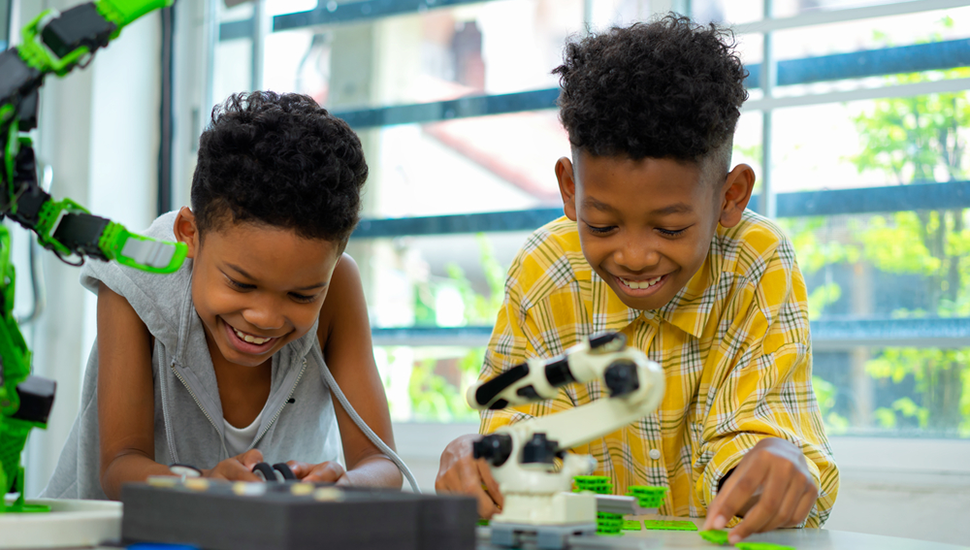Holistic Education: Nurturing Creative Minds

In today’s tech-centric educational environment, creativity and hands-on learning often seem overshadowed by screens and standardized tests. However, a growing movement within the academic world is bringing a renewed focus on hands-on activities, crafts, and problem-solving skills. This shift in education emphasizes the importance of engaging students in practical, tactile experiences that stimulate both the mind and body.
This approach challenges the assumption that education must be tech-driven to be effective. Instead, it underscores the importance of a holistic education, one that integrates both intellectual, creative, and experiential elements. By blurring these boundaries, we discover a richer and more balanced approach to learning.
Building Competence & Confidence
The emphasis on traditional tactile skills, such as crafting, baking, and building may seem outdated in our modern world, but these activities offer invaluable lessons in self-reliance and versatility. Engaging in these tasks fosters a sense of accomplishment and self-confidence that is often missing in more abstract academic pursuits.
In a world where many children face isolation and a decline in basic life skills, engaging in these hands-on activities can be a powerful antidote. By mastering these traditional skills, students develop problem-solving abilities and the confidence to tackle new challenges, equipping them with the tools they need to navigate both their academic and personal lives with greater resilience.
The Value of Arts Education
Arts education plays a critical role in developing well-rounded students, yet it often struggles to find its place within the broader academic curriculum. However, recent research has reinforced the importance of the arts in education. A study by the Brookings Institution highlights the positive impact of arts education on students’ academic and social-emotional outcomes. The study found that students who engage in the arts show improvements in their writing skills, exhibit greater empathy, and demonstrate stronger critical thinking abilities.
This evidence supports the idea that arts education is not merely an extracurricular activity but a fundamental component of holistic learning. Incorporating the arts into the curriculum allows students to express themselves creatively, develop emotional intelligence, and enhance their cognitive skills. For educators, this means recognizing the arts as a vital tool for fostering a deeper, more comprehensive learning experience.
The Power of Play in Learning
Incorporating play into the learning process is not just beneficial; it’s essential. Play fosters creativity and critical thinking, allowing children to explore concepts in tangible and engaging ways. Schools that strike a balance between structured academics and unstructured playtime often produce more well-rounded, enthusiastic learners. Play is not merely a break from learning; it is a vital component of cognitive development.
Activities like building a fort, organizing a scavenger hunt, or engaging in imaginative play can spark curiosity and innovation. By integrating play into educational frameworks, we nurture a generation of thinkers who can blend academic knowledge with practical application, leading to holistic growth and lifelong learning.
Beyond Academics: Embracing a Holistic Approach to Learning.
While academic pursuits are undeniably valuable, they should not overshadow the importance of other forms of learning. Writing an essay sharpens critical thinking and communication skills, math hones deductive reasoning, and science provides the foundation for understanding the world around us. However, our culture’s emphasis on academics and technology often leaves little room for other enriching experiences.
It’s essential to encourage students to occasionally set aside their books and calculators and engage in hands-on activities that stimulate exploration, creativity, and critical thinking. Parents and guardians can play a crucial role by participating in these activities with their children, reinforcing the idea that learning happens both inside and outside the classroom. By embracing a more balanced approach to education, we can help students develop into well-rounded individuals—equipped to grow and thrive beyond the classroom.
About TLC
The Lincoln Center for Family and Youth (TLC) is a social enterprise company serving the Greater Philadelphia Area. Among its five divisions, TLC offers School-based Staffing Solutions, Mobile Coaching and Counseling, and Heather’s Hope: A Center for Victims of Crime. These major programs are united under TLC’s mission to promote positive choices and cultivate meaningful connections through education, counseling, coaching, and consulting.